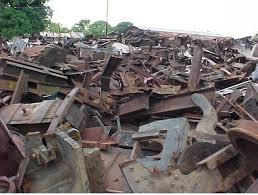Parliament has adopted a report of the Committee on Subsidiary Legislation that bans the export of ferrous scrap metals. By the adoption, the country hence bans the export of such metals.
Presenting the report on the Ferrous Scrap Metals Prohibition of Export Regulations 2013, LI.2201, the Chairman of the Committee on the Subsidiary Legislation, Osei Bonsu Amoah said a ban on the exportation of ferrous scrap metals will ensure that local companies have the required quantities of the scrap metals for their operations.
This he noted will enhance the profitability of the companies and increase their capacity to create employment and reduce the foreign exchange expended on the importation of billets as raw materials for steel mills in the country.
Radio Ghana’s Parliamentary Correspondents Dominic Hlordzi and Augustus Acquaye reported that the Chairman of the Committee on the Subsidiary Legislation, Osei Bonsu Amoah, says research has shown that scrap generation in Ghana is enough to meet the demand of existing metal industries.
In 2001 about one hundred and ten thousand tonnes of scrap metals were found to be available in the country.
Globally, ferrous metals are used for engineering purposes and for the manufacture of steel products such as cutting tools and cutlery, surgical instruments and engines blocks.
There are large scale steel manufacturers in the country like Tema Steel and Western Steel which utilize ferrous metals as their primary raw materials.
Mr. O.B. Amoah, observed that these companies provide direct and indirect employment for a number of people in the manufacture of metal gates, coal pots and metal chairs among others.
He said notwithstanding the contributions of the metal companies to the economy, they continued to be deprived of the needed raw materials and this compels them to operate below capacity.
This he explained is as a result of the uncontrolled export of large volumes of scrap metals out of the country. In 1980, an administrative ban was placed on the export of the metals, however in 2008 some flexibility was introduced to allow for the export of the metals but this has been abused.
To effectively address the issue, the Minister of Trade and Industry laid the LI in Parliament on the 22nd of February this year, in accordance with Article 11 of the Constitution and to give effect to the administrative ban which has been in existence for over two decades.
The Regulation provides for the establishment of a Scrap Metal Monitoring Committee to oversee implementation of the law.
The Instrument which prohibits and prescribes punishment upon conviction comes into force at the expiration of twenty-one Parliamentary sitting days.
Business News of Wednesday, 27 March 2013
Source: GBC
Parliament bans export of ferrous scrap metals

















